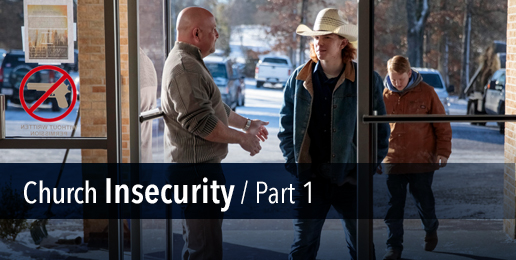
It was a Lifeway Research report earlier this spring that “triggered” my interest on church security.
Most of us in the faith community seem to go about our weekly church business not too concerned about safety at our house of worship.
Fortunately, others take this quite seriously.
Church security is a broader topic than one might think. I recall my membership in a Dallas megachurch in the 1980s where building and parking garage security was a must. Occasional visits from relatively non-threatening types often needed to be escorted from the premises.
Even the pastor had a personal security detail present before and after services.
Times have changed.
In June, Christianity Today (CT) reviewed the latest research on church security from Lifeway. It shows that pastoral concerns over security have elevated in part because “numerous fatal shootings have occurred at churches in recent years.” (Interestingly, since 1999 almost 50% of fatal shootings have occurred in the South.)
Jewish synagogues and Sikh temples have also experienced this violence.
And it’s not just worship centers. We can recall that earlier this year six people were killed at a Christian school in Nashville, Tennessee. We must realize that anywhere children gather should raise our security awareness.
Someone well acquainted with this topic is Jack Rolfe.
Currently, Jack serves as the Safety & Security Manager overseeing five campuses for Christ Community Church based in St Charles, Illinois. Previously, he worked in “Campus Assurance Ministry” at Calvary Church in Naperville, Illinois — another mega church campus.
Beyond his church role, Jack’s 30-plus years in this work enabled him to write the book, Watch MY Sheep—Establishing and Running Your Security Ministry.
He speaks at numerous church security conferences. And he’s the founder of “Ministry of Church Defense” a Chicagoland area networking group open to all churches. He’s worked with all levels of law enforcement, including the Secret Service.
As Jack says,
“Most of what we deal with on a week-to-week basis are mentally challenged people, lost kids, medical issues, and some domestic problems. Simply showing a security presence often acts as a deterrent.”
Perhaps it’s difficult for us to think of church security as ministry.
Not for Jack.
Security volunteers need training to understand how to “delicately deal with mentally challenged people, disruptions, lost kids, medical issues, and to evaluate a building’s physical security.” There’s roughly about a 4% chance of a shooter incident happening at a church.
Therefore, prevention is the foremost concern.
Do larger churches face greater concerns in this area than smaller ones? While it’s true that crime doesn’t set boundaries, larger churches do present a bigger target. They’re far more visible. These venues often have high profile speakers, conferences, and musical artists that attract more attention. In these cases, Jack has found it useful to create a “threat profile.”
As for those senior pastors having a personal security detail, that role increases their risk for harassment or harm.
In some cases, Jack Rolfe says their security detail moves into a “zone defense mode.” Apart from actual harm, these workers provide another important function: intervention from pigeonholing parishioners! Some folks just don’t know when to move on!
What about simply “trusting God for our safety?” The Lifeway survey of churches revealed that many churches have no security plan in place. Some might claim a Scripture like Psalm 20:7,
“Some trust in chariots and some in horses, but we trust in the name of the Lord our God.”
I think I can answer the trusting God question. Having served on church councils previously, I would dread the conversation with any parent who lost a child because of poor church security decisions.
And frankly, it puts God in a bad position of blame for the lack of common sense of church leadership.
We don’t leave the doors unlocked on our homes and cars. We install cameras, smoke and fire alarms, and devices that warn us of dangerous CO2 leaks.
We don’t allow small children to be in situations that could be perilous.
We do this all out of love. And to this we add our humble prayers.
In the second part of this discussion with Jack Rolfe, we’ll consider how churches of all sizes should take security more seriously. Also, who should be carrying guns to church. And should security be visible?
Stay tuned!




















